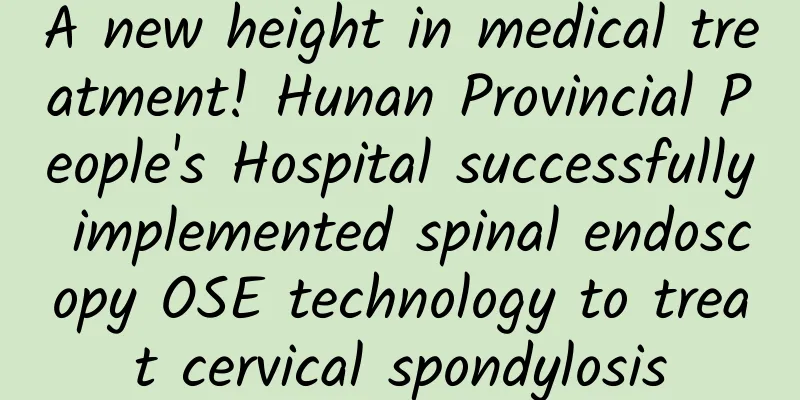A new height in medical treatment! Hunan Provincial People's Hospital successfully implemented spinal endoscopy OSE technology to treat cervical spondylosis

|
Recently, the Spine Surgery Department of Hunan Provincial People's Hospital was the first in our province to successfully implement spinal endoscopy OSE technology (open channel endoscopy technology) to treat cervical spondylosis, marking a new step for our province in the field of minimally invasive spinal treatment . (Professor Shen Xiongjie and Associate Professor Chang Lei performed surgery on patients using spinal endoscopic OSE technology) Cervical spondylosis is a common degenerative spinal disease. Traditional surgical treatment of cervical spondylosis often requires a large incision and extensive muscle stripping, which is traumatic and slow to recover. As an internationally leading minimally invasive technology, spinal endoscopy OSE technology only requires an incision less than 2 cm, using a high-definition endoscope system and precision conventional instruments to complete precise treatment of cervical lesions. This technology has the advantages of less trauma, less bleeding, faster recovery, and shorter hospitalization time, which greatly reduces the pain of patients. (Intraoperative fluoroscopic image) The operation was led by Professor Shen Xiongjie's team from the Department of Spine Surgery at Hunan Provincial People's Hospital. One of the patients was a middle-aged woman who had been suffering from cervical spondylosis for a long time. The compression of the nerve roots caused numbness and pain in the left upper limb, which seriously affected her quality of life. After a detailed preoperative evaluation, Chief Physician Liu Xiangyang, Director of the Department, and Chief Physician Shen Xiongjie, Deputy Director of the Department, decided to use OSE technology to treat her. The operation went smoothly. The patient's symptoms were significantly relieved after the operation. He was able to get out of bed and move around the next day, and the recovery effect was remarkable. (Compared to traditional surgery, spinal endoscopic OSE technology has minimal incision) Surgeons Professor Shen Xiongjie and Associate Professor Chang Lei said: In the field of spinal surgery, cervical spine surgery has always been a difficult operation and can be likened to the "crown jewel". The minimally invasive endoscopic technology (OSE technology) is now applied to the treatment of cervical spondylosis, providing patients with cervical spondylosis with a new treatment option. The successful implementation of OSE technology is not only another milestone for the Department of Spine Surgery of Hunan Provincial People's Hospital, but also injects new impetus into the development of minimally invasive spinal technology in the province. In the future, the Department of Spine Surgery of Hunan Provincial People's Hospital will continue to leverage its technological advantages to promote the popularization and application of spinal endoscopic technology, further improve the level of diagnosis and treatment, and bring good news to more patients with spinal diseases with more sophisticated medical skills and better services. Hunan Medical Chat Special Author: Li Mao, Department of Orthopedics 3, Hunan Provincial People's Hospital Follow @湖南医聊 to get more health science information! (Edited by YT) |
>>: Prevent cancer before it happens! Do you pay attention to these ten cancer warning signs?
Recommend
What is the reason for the enlargement of uterine fibroids in the abdomen after moxibustion?
Uterine fibroids are a common benign tumor among ...
Apple's retail store operating secrets to maintain sales
There was an article about Apple retail stores th...
What is the reason for hair growing next to the nipples?
It is relatively rare for female friends to have ...
How can a 100-pound girl lose weight?
Everyone loves beauty, especially some female fri...
What to do if you have breast pain and lumps during weaning
With the mother's efforts, the baby can easil...
Why do women have menstruation?
Normally, women will have menstruation between th...
Are the three types of breast nodules serious?
Women with breast hyperplasia need timely treatme...
Why is my period suddenly delayed?
Women may have experienced the symptom of sudden ...
Wearing high heels often can cause arthritis in old age
Women should try to avoid walking in pointed high...
What to do if you feel uncomfortable and can't eat in the early stages of pregnancy
Women’s suffering begins with pregnancy. Women in...
What can women eat to restore menstruation after menopause
Irregular living schedules, day and night reversa...
A woman dreams of herself laughing
Laughter is a form of expression of happiness and...
What are the symptoms of kidney deficiency in women?
In today's society, the status of women is re...
If you don't want to be a "belly woman", you must know these four abdominal massage weight loss methods
A flat and firm abdomen is what girls dream of, b...









